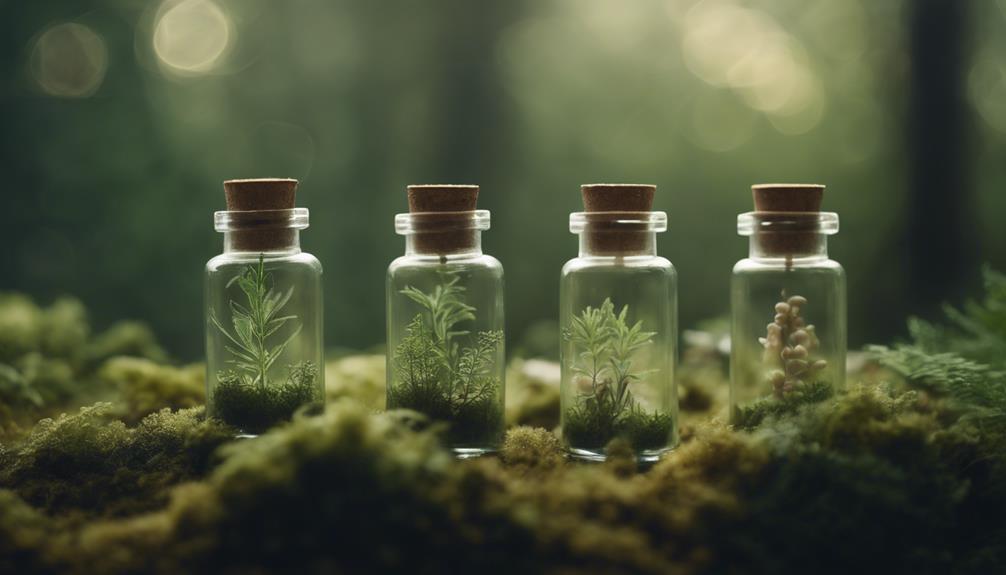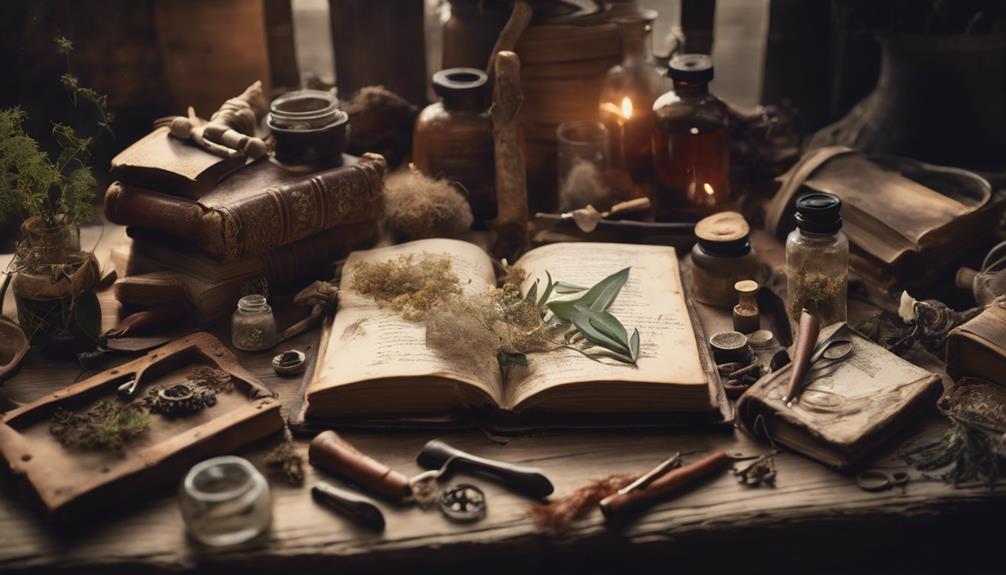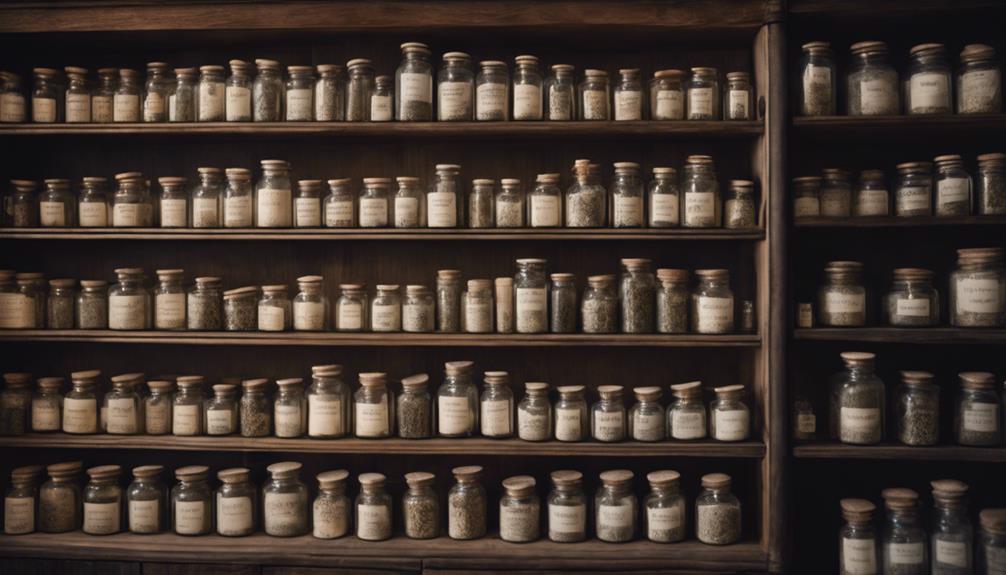As we explore the history of herbalism, it's clear that the concept of herbal remedies wasn't invented by a single person or group. Instead, it evolved over thousands of years through the cumulative knowledge of ancient civilizations. From the written records of medicinal plants in ancient Sumeria to the Ayurvedic texts mentioning over 300 herbs, herbalism has been shaped by numerous cultures. The influences of Greek physician Dioscorides, Roman Empire's widespread influence, and medieval apothecaries have all contributed to the rich tapestry of herbalism. As we continue to uncover the roots of herbalism, we'll discover even more fascinating stories and unexpected connections.
Key Takeaways
• The earliest written evidence of medicinal plant use dates back to ancient Sumeria over 5,000 years ago.
• The Sumerians' written records of medicinal plants influenced herbal traditions in ancient Egypt, Greece, and beyond.
• The Greek physician Dioscorides wrote a detailed herbal text that contributed to the development of botanical classification systems.
• Medieval apothecaries prepared and dispensed herbal remedies, using herbs like chamomile, lavender, and sage to treat various health issues.
• Eastern influences, such as Ayurveda and Traditional Chinese Medicine, enriched Western herbalism by introducing new herbs and holistic healing approaches.
Ancient Civilizations and Plant Medicine
Moreover, it's evident that ancient civilizations were well aware of the medicinal properties of plants, with evidence of their use dating back thousands of years.
In ancient Mesopotamia, the Sumerians left the first written record of medicinal plants over 5,000 years ago, showcasing early human awareness of plant medicine.
Similarly, Ayurvedic texts dating back thousands of years mention over 300 herbs, highlighting the rich history of herbal medicine in ancient Indian civilization.
Hippocrates, the father of Western medicine, also emphasized the use of medicinal plants in treating illnesses and separating medicine from religious practices around 400 BCE.
Additionally, monasteries in medieval Europe played a pivotal role in documenting herbal remedies and preserving knowledge of plant medicine during the Middle Ages.
Moreover, Indigenous Peoples in various cultures around the world have long used plants for medicinal purposes, influencing the development of herbalism in different regions.
These examples illustrate that ancient civilizations had a deep understanding of herbal medicine, which has been passed down through generations, shaping the course of herbalism as we know it today.
Sumerian Roots of Herbal Remedies

We find the earliest written evidence of medicinal plant use in ancient Sumeria, where over 5,000 years ago, the Sumerians created detailed records of herbal remedies that would influence the course of herbalism for millennia to come.
The Sumerians' written records of medicinal plants, including licorice, opium poppy, and henbane, demonstrate their advanced knowledge of botanical medicine. They effectively utilized plants like myrrh and juniper for their healing properties, showcasing a sophisticated understanding of herbal medicine.
These ancient innovators laid the groundwork for later civilizations, such as the Assyrians and Babylonians, who further developed herbal remedies. The Sumerians' texts on herbal medicine served as a foundation for the herbal traditions that would evolve in ancient Egypt, Greece, and beyond.
Their pioneering work in botanical medicine paved the way for future generations to explore and refine the art of herbalism. By examining the Sumerians' written records, we gain insight into the origins of herbalism and the innovative spirit of ancient civilizations.
Greek and Roman Herbal Legacy

Building upon the foundations laid by the Sumerians, the ancient Greeks and Romans greatly advanced the art of herbalism, leaving an enduring legacy that continues to shape modern herbal practices.
Greek physician Dioscorides compiled a detailed herbal text, De Materia Medica, in the 1st century AD, containing descriptions of over 600 plants.
Greek and Roman Contributions:
- Greek knowledge of medicinal properties
- Development of botanical classification systems
- De Materia Medica by Dioscorides
- Standardization of herbal medicine
- Galen's emphasis on balance in the body
- Understanding of holistic approach to health
- Roman Empire's widespread influence
- Spread of herbal knowledge throughout Europe and beyond
- Classification of plants based on medicinal properties
- Laying the foundation for modern herbal practices
Legacy:
- Modern herbal practices
- Foundation for modern herbalism
- Influence on modern herbal medicine
- Global herbal legacy
- Enduring herbal legacy
As we explore the Greek and Roman herbal legacy, we see how their contributions continue to shape modern herbal medicine. From Galen's emphasis on balance in the body to the widespread influence of the Roman Empire, their impact on herbalism is undeniable.
The Greek and Roman herbalists' classification of plants based on their medicinal properties laid the foundation for modern herbal practices, ensuring their herbal legacy continues to thrive.
Medieval Apothecaries and Herbs

During the Middle Ages, skilled medieval apothecaries prepared and dispensed herbal remedies, leveraging their knowledge of chamomile, lavender, rosemary, and sage to treat various ailments. These apothecaries played an essential role in providing healthcare by compounding and prescribing herbal treatments.
Their use of herbs was often influenced by the humoral theory of medicine prevalent during the medieval period. Many of these medieval apothecaries were members of guilds that regulated their practices and guaranteed quality control of herbal medicines. As a result, there was a high level of expertise in the preparation and dispensing of herbal remedies.
In fact, apothecaries were responsible for creating complex herbal treatments that addressed a range of health issues. By leveraging their knowledge of herbalism, medieval apothecaries made significant contributions to the field of healthcare. Their work not only improved the lives of people during the Middle Ages but also laid the foundation for future generations of herbalists.
Through their dedication to quality control and expertise, medieval apothecaries helped shape the course of herbalism as it's understood today.
Eastern Influences on Western Herbalism

As medieval apothecaries refined their craft, Eastern influences began to seep into Western herbalism, introducing a rich tapestry of new herbs, techniques, and philosophies that would forever reshape the practice. We see this in the ancient Indian system of medicine, Ayurveda, which mentions over 300 herbs in its texts, greatly impacting Western herbalism.
Similarly, Traditional Chinese Medicine (TCM) has a long history of using herbs like ginseng, ginger, and astragalus, which have been adopted in Western herbal practices. The concept of yin and yang in TCM has also shaped our understanding of balancing energies in Western herbalism.
In addition, practices like acupuncture and acupressure from TCM have been integrated into Western herbal medicine for holistic healing approaches. The knowledge of Eastern herbs and healing techniques has enriched the diversity and effectiveness of Western herbalism.
Frequently Asked Questions
Where Did Herbalism Originate?
When we ask where herbalism originated, we're diving into a rich history that spans thousands of years.
We find evidence of medicinal plant use dating back to Paleolithic humans, with written records emerging in ancient Sumeria over 5,000 years ago.
Ayurveda, an ancient Indian system, also documents over 300 herbs. Clearly, herbalism's roots are deep and diverse, influenced by various cultures and traditions.
When Was Herb Invented?
Let's set the record straight – herbs weren't invented at a specific point in time. We didn't stumble upon a magical plant one day and suddenly have herbalism.
The truth is, humans have been using herbs for thousands of years, with evidence dating back to prehistoric times. It's an evolving practice that developed organically as we discovered the medicinal properties of various plants through trial and error.
How Long Has Herbology Been Around?
We've been using herbs for thousands of years, with evidence of proto-humans consuming medicinal plants like willow, St. John's wort, and chamomile.
The Sumerians created the first written record of medicinal plants over 5,000 years ago, and Ayurvedic texts mention over 300 herbs.
Herbalism has a rich history, with significant milestones like the first herbal book printed in English, the Grete Herball, dating back to 1526.
Who Is the Father of Herbalism?
We've all wondered, who's the pioneer behind herbalism? Well, let's cut to the chase – it's none other than Hippocrates, the ancient Greek physician.
Dubbed the 'Father of Medicine,' he revolutionized healthcare by separating it from religious practices. His emphasis on observation, physical causes, and herbal remedies paved the way for modern botanical medicine.
His teachings continue to inspire herbalists and practitioners to this day.
Conclusion
As we reflect on the origins of herbalism, we're reminded that this ancient practice has evolved over time, influenced by various cultures.
For instance, consider the example of Hildegard of Bingen, a 12th-century German abbess who wrote extensively on medicinal herbs. Her work, 'Physica,' detailed remedies using local plants, showcasing the integration of Eastern and Western herbal traditions.
This historical example illustrates how herbalism has been shaped by diverse civilizations, ultimately enriching our understanding of plant medicine today.










